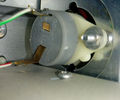Potentiometers
Potentiometers are a common source of problems in old scopes. Often, just working the potentiometer back and forth over its range is sufficient to rejuvenate it. Other times, it is necessary to spray some cleaner into the pot.
Many of the potentiometers in Tektronix instruments are parts Tek bought. Some of the potentiometers were made by Tek.
1960s stop-less potentiometers
In 1962, Tek-made potentiometers started being used in many instruments. These are typically identifiable by their gray delrin cover (and their Tek part number).

They are "stopless" pots, which means that they have a detent but can be rotated through the detent. This feature was intended to reduce shaft and pot problems that result from excessive torque on traditional pots.
These types tend to develop cracks in the cross-shaped plastic part that holds the setscrew clamping the shaft. Tightening that screw then causes the crack to widen, and the shaft is not clamped strongly enough anymore, causing it to slip.
Trying to fix the problem using epoxy (alone) is usually not effective. Solutions require to compress the broken plastic part in a circular fashion, either by wrapping wire or slipping a machined ring or suitable steel clamp over it.
Some types affected are:
| Type | Resistance | Used in |
|---|---|---|
| 311-068 (311-0068-00) | 500 kΩ | VAR GAIN in Type Z (R7620) |
| 311-234 (311-0234-00) | 1.5 kΩ | VAR GAIN in 3A72 (R445, R545) |
| 311-259 (311-0259-00) | 710 Ω | VAR GAIN in Type O (R6530) |
| 311-279 (311-0279-00) | 770 Ω | VAR GAIN in Type CA (R3338, R4338) |
| 311-304 (311-0304-00) 311-309 (311-0309-00) |
185 Ω | VAR GAIN in 3A74 (R426) |
| 311-0603-00 | 185 Ω | VAR GAIN in 1A4 (R75 ×4) |
Pictures
311-259
311-279
-
close-up of cracked plastic part, partial fix using tightened wire
-
-
311-304
-
311-0304-00 pot, VAR GAIN in a 3A74



